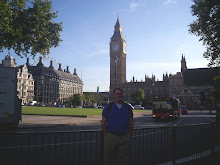The story of William Wilberforce is a marvelous one, and Hague tells it well. He puts Wilberforce's drive to abolish the slave trade squarely within Wilberforce's own beliefs in evangelical Christianity. Hague also demonstrates how Wilberforce was essentially a conservative man determined to pursue the radical goal of abolishing the slave trade.
The fight to abolish the slave trade took twenty years and the fight to completely abolish slavery went on for another 17 years. Hague's real talent comes from situating Wilberforce's crusade within the larger historical movements of the early 19th century. For instance, the greatest setbacks to Wilberforce's attempts to end the slave trade came as a result of actions in France. Hague also does a good job of dealing with Wilberforce's work inside the House of Commons. There are extended sections dealing with elections in the early 19th century and also on how Parliament conducted its business. With Wilberforce such a towering political figure, the book also gives insights to the political issues of the day; including how politicians and the royal family interacted.
Hague also includes Wilberforce's non- political affairs. Wilberforce contributed much to evangelical thought in early 19th century Britain, and the book shows how much of Wilberforce's life centered around religion. Wilberforce and his relationship with his family are detailed but not as much as some other relationships. One of the best parts is how many people came through Wilberforce's life; everyone from John Newton to William Pitt to the Royal Family. Wilberforce was at the center of British political life and the book can give a reader some insight into life in early 19th century Britain.
A lot of times I find books written by British authors to be a little dense to get through. Wilberforce took some time to get through but that is because the book is so meaty. However, Hague's style makes the book accessible and a real informative treat to read.

No comments:
Post a Comment